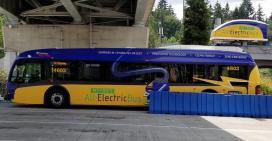U.S. Department of Transportation Announces $55 Million in Grants to Transit Agencies to Deploy Clean Buses
WASHINGTON – The U.S. Department of Transportation’s Federal Transit Administration (FTA) today announced selections for an expanded Low or No-Emission (Low-No) Bus Competitive Grant Program that reflects growing interest in new technology buses. Twenty transit providers in 13 states will receive a share of $55 million for transit buses and related technology that replaces aging diesel fuel buses with battery-electric or fuel cell-powered vehicles and incorporates other innovations.
“The Obama Administration continues to invest in clean transportation infrastructure, and our Low-No program is putting more American-made, energy-efficient buses into service across the country,” said U.S. Transportation Secretary Anthony Foxx. “By placing more modernized, non-polluting buses on the roads, we are improving the rider experience and continuing to extend ladders of opportunity to people who take public transportation every day.”
Replacing traditional buses with electricity-powered buses that generate low or no emissions lessens reliance on fossil fuel, reduces greenhouse gas emissions and improves operating efficiency. The selected projects represent strategic investments to help reduce air pollution, train employees in maintaining new technology buses, and connect people to jobs and services through efficient bus transit networks.
“Our Low-No grant projects represent the latest and greatest bus services running on state-of-the-art technology, resulting in cleaner air and lower costs in the long run,” said FTA Acting Administrator Carolyn Flowers. “By investing in new technology bus fleets, we help transition an industry that many depend on to a model of green, efficient service.”
FTA awarded the FY 2016 funds after a competitive review of more than 100 applications. The grants allow agencies to acquire buses and supporting facilities and infrastructure such as maintenance facilities and recharging equipment – including new “en-route” charging that extends battery life. Many agencies also use the grants to develop knowledge in their workforces about how to operate and maintain a new generation of buses.
Among the projects selected to receive 2016 Low-No funding:
- Santa Clara Valley Transportation Authority of California will purchase battery electric zero-emission buses and fast-charging stations, upgrade a maintenance facility and provide workforce training on maintaining new technology buses.
- The Miami-Dade Department of Transportation and Public Works will receive funding to purchase 40-foot electric buses, which will replace part of a fleet that now has 70 percent of its traditional buses operating beyond their expected useful life.
- Park City Transit of Utah will receive funding to purchase zero-emission buses that will run on a bus rapid transit route and provide high-frequency service connecting major activity areas and giving residents and visitors a viable commuting option with cleaner, more fuel-efficient vehicles.
FTA’s Low or No Emission Vehicle Grants Program has evolved from a research and deployment program that was established under the Moving Ahead for Progress in the 21st Century Act (MAP-21) into an annually funded grant program. The Fixing America’s Surface Transportation (FAST) Act more than doubled the amount of funding available and moved the Low-No Program under the existing Bus and Bus Facilities Program.
The Low-No Program focuses on –assisting transit agencies to acquire the cleanest and most energy-efficient U.S.-made transit buses to support the transition of the nation’s transit fleet to the lowest polluting and most energy-efficient transit vehicles. The program builds on the success of FTA’s National Fuel Cell Bus Program, which invested in the research, development and testing of alternative fuels and related equipment for the transit industry.
###

